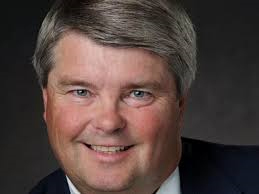News
30 January 2018
Your 7 Retirement Resolutions for 2018
The New Year is already a month old. What better time to check in and ask ourselves that all important but seemingly impossible question to answer:
Am I ready to retire?
Yes, no, maybe?! If so, keep reading.
Barry LaValley is a leading Canadian educator, retirement expert and author of the book: ‘So you think you are ready to retire’. He’s spent the last 30 years working in the field of retirement psychology, exploring the transition issues faced by pre and post retirees around the world.
Late last year he launched a new edition of his book specifically aimed at a New Zealand audience and is back in the country next month for a series of events and workshops designed to help retirees make the most of their retirement.
We asked him for some ‘Retirement Resolutions’ for the New Year:

1. Make 2018 the Year of Your Retirement Plan
It is a well-known fact that most New Zealanders are woefully unprepared for retirement. LaValley says we’re no different from most other western countries.
“People don't really think it through. They drift into it. They know what they're retiring from, but not what they're retiring to.”
But LaValley says a retirement plan is imperative, and he’s not just talking finance.
“Being financially prepared for your retirement is not enough. We have an ageing population who need to decide what they’re going to do for what could be 30 long years. And there is no road map for this. Our parents didn’t go through it like we will. They quit work, and essentially went on holiday until their health failed and then they died.
But things have changed. Your retirement can’t be a holiday. This is not going to be a 30-year long weekend and your health and your relationships are not going to stay the same. That’s not real life.
You don’t know what’s going to happen so you need to take a realistic view of the future and decide what it is you want to accomplish.”

Retirement expert, Barry LaValley
2. Keep working for as long as you want to
LaValley says for many people the move to early retirement is not what they thought it was going to be.
“It turns out the need for certainty and self-fulfilment doesn’t change once you retire. As a result, I see a lot of retirees move to self-employment because it fills a void in their lives that has to do with their feelings of involvement and relevance. The need to be relevant is so important to our egos and this needs to drive the decisions we make about our lifestyles.
We need to accept work as a fundamental part of our lives and see it as equally valuable as our leisure activities. The only difference once you’re retired is that it doesn’t need to be paid work, and you don’t have to be as miserable!”
3. If you're happy and you can, stay exactly where you are
Retiring in place is one thing LaValley says New Zealanders do well.
“New Zealanders are so blessed in that most of the country enables outdoor living all year round. Retiring in place means that retirees can be more family oriented and closer to friends. That’s a real positive.
Here in Canada and the US we’re far more transient in our retirement. We think palm trees and green grass are all we need to be happy so we move whole states thinking the grass will be greener on the other side. This is not necessarily the case and usually we end up isolating ourselves.”
4. Focus on your health and wellbeing
LaValley says although most baby boomers have had a good start in life and benefited from advances in medical science, poor diet, sedentary occupations and mental stress are beginning to take their toll.
Typical surveys show boomers are 30 per cent more obese, 46 per cent more likely to have diabetes and 38 per cent more likely to have high blood pressure, than the generation before them.
“Health issues are a real challenge for our group. Now we’re suddenly getting our parents diseases and we’ve got friends dying of natural causes. Welcome to getting older! But what needs to come with that realization is a desire to taste the sweetness of life. We all need to think about what we want to get out of this time and really make the most of it. A part of that is making healthy life choices.”
5. Ignore the number 65
“Retiring at 65, getting into a caravan and traveling around the world is not reality. 65 is a completely artificial number. It started in the States and pretty much the whole world has since adopted it as the demarcation age between young and old.
I’m 65 and yes on one hand I’m closer to death than I am to Woodstock but on the other, I don’t feel old at all.”
LaValley is an advocate for raising the retirement age to 68.
“This has been talked about in Canada but not in the US where it’s predicted social security will run into trouble in 2034. Britain and Australia are really leading the way and I hope other governments follow suit, including New Zealand.
Yes of course if I’m a sheep shearer I’m going to want to retire at 65 but most of us don’t work such physical jobs. In other words, we don’t have to depend on what we get from a government pension. We can continue to contribute

LaValley's book - So you think you're ready to retire?
6. Sort out your relationships
“I say lets talk about your life first, the money second.
Too much retirement discussion is dedicated to financial security – it’s like if you have enough money everything will look after itself. That advice comes from financial planners - not very good ones.
Retirement can be very tough on relationships. For many couples, a dynamic has been established decades ago that reflects things like household chores, time spent together, spending priorities etc. Now couples have to deal with the concept of a “24-7” life together —that can be really difficult for some people.”
LaValley says retirement is a time to renew the relationship and reestablish the priorities.
“The challenge is that people don’t think about the relationship dynamic as they prepare for their “perpetual holiday”. Perhaps this has the most critical impact on relationship dysfunction and ultimately “grey divorce”.
7. Learn to ‘self-actualise’
Self-actualising is choosing a life structure based on your deepest values.
“Retirement is the life stage where you can finally do whatever it is you most want to do. You can switch focus from the material to the emotionally or spiritually satisfying.”
But LaValley says few people are used to self-actualising in this way.
“Although our generation likes the idea of self-actualising we’re really not that good at it. We need much better support from doctors, trainers and coaches. In fact, I think the best financial advisers are the ones that ‘coach’. The relationship they foster is not about money, it’s about helping their clients make the best of the resources they have to create the life that they want.
Retirement is not a long deserved holiday but a chance for a second life. If you can discover what matters to you most, that’s when you’ll reach retirement freedom.”

What could your income be?